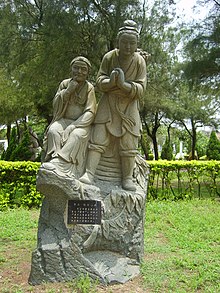Zeng Shen

Zeng Shen ( Chinese 曾參 , Pinyin Zēng Shēn ) or Zengzi ( 曾子 , Zēngzǐ "Master Zeng"; born 505 BCE ; died 436 (?) BCE ), zi : Ziyu子舆, was a philosopher in China Time of the late spring and autumn periods . He was from Lu State and was the son of Zeng Dian 曾 点. He was one of Confucius' most able and popular students . In the Confucian tradition it takes the third place after Confucius and Meng Ke . He emphasized the importance of the principle of " filial piety " ( xiào ) and viewed this as a guarantor of universal virtue. Tradition attributes to Zengzi the creation of Confucian works such as Daxue (Great Learning) and Xiaojing . In the literature catalog of the book Hanshu ( History of the Western or Earlier Han Dynasty ) a compilation of his writings is mentioned as " Zengzi " (Master Zeng) from eighteen chapters. This writing was later lost. According to the Lüshi chunqiu and Sima Qian , Wu Qi吳起 was a student of Zengzi ( Lüshi chunqiu , Book 2, Chapter 4 ; Sima Qian, Shiji , Chapter 65 ). Another student from Zengzi to Mencius was Zixiang子 襄 ( Mengzi , 2A.2 ). The neo-Confucian philosopher Ye Shi (1150-1223), a representative of the Yongjia philosophical school ( 永嘉 学派 , Yǒngjiā xuépài ), expressed doubts that Zengzi correctly conveyed the teaching that Confucius was dealing with Dao . Information on Zengzi and his views can be found in the works Lunyu (Conversations of Confucius), Mengzi (Mencius), Zhuangzi , Xunzi , Huainanzi , Lüshi chunqiu, and other ancient Chinese scriptures .
Quote (Lunyu IV, 15)
"The master said:" Isn't it, Shen, my whole teaching [dao] is dealt with in one. "Master Dsong said:" Yes. "When the master was out, his students asked and said," What does that mean? "Master Dsong said: "Our master's teaching is loyalty to oneself and goodness to others: everything is concerned with it."
Conversations of Confucius , translated by Richard Wilhelm : "The sum of the teaching" "
“子曰 :“ 參 乎! 吾道 一 以 貫 之。 ”曾 子曰 :“ 唯。 ”子 出。 門 人 問 曰 :“ 何謂 也? ”曾 子曰 :“ 夫 子之道 , 忠恕 而已 矣。 ”“
various
The Zeng Temple or Zengzi Temple in Jiaxiang County , Shandong , has been on the list of monuments of the People's Republic of China (6-617) since 2006 and on the list of monuments of Shandong Province (2-44) since 1992 .
See also
- The Twenty-four Filial Exemplars (Ershisi xiao 二十四孝)
- Twenty-four persons showing filial piety
References and footnotes
- ↑ For example, it was noted that only You Ruo有 若 and Zeng Shen are spoken of as "masters" in Lunyu (see Conversations of Confucius , translated by Richard Wilhelm ).
- ↑ 孝經 / 孝经 , Xiàojīng , Hsiao-ching , English Classic of Filial Piety - cf. Hiau Ging (Xiaojing) , translated by Richard Wilhelm with The Book of Awe .
- ↑ cf. the translation of the Analects by Arthur Waley ( digitized version )
- ↑ Zeng miao曾 庙 or Zengzi miao曾子 庙
literature
- Li Qiqian 李启谦: Kongmen dizi yanjiu孔门 弟子 研究 (Studies on the Confucius Students). Jinan, 1987
- Li Qiqian 李啟謙 and Wang Shilun 王 式 倫 (Eds.): Kongzi dizi ziliao huibian孔子 弟子 资料 汇编. Jinan: Shangdong youyi shushe 1991
- Zehou Li: A History of Classical Chinese Thought. 2019 ( partial online view )
- Bryan W. Van Norden: "The Dao of Kongzi." Asian Philosophy: An International Journal of the Philosophical Traditions of the East, 1469-2961, Volume 12, Issue 3, 2002, Pages 157-171
Web links
- Zeng Shen 曾參 or Zengzi 曾子
- Daily self-examination (Lunyu I.4)
- 《高清 版》 二十四孝 动画 之 三 - 啮 指 心痛 周朝 曾参 (Children's film based on the Zeng Shen story from 24 examples of filial piety )
- 二十四孝 的 故事 : 曾参 养 志 (photo)
| personal data | |
|---|---|
| SURNAME | Zeng Shen |
| ALTERNATIVE NAMES | 曾參; 曾子; Zengzi; Tseng Shen; Dseng Dsï; Tseng-tzu; Dsong Schen |
| BRIEF DESCRIPTION | philosopher |
| DATE OF BIRTH | 505 BC Chr. |
| DATE OF DEATH | uncertain: 436 BC Chr. |

